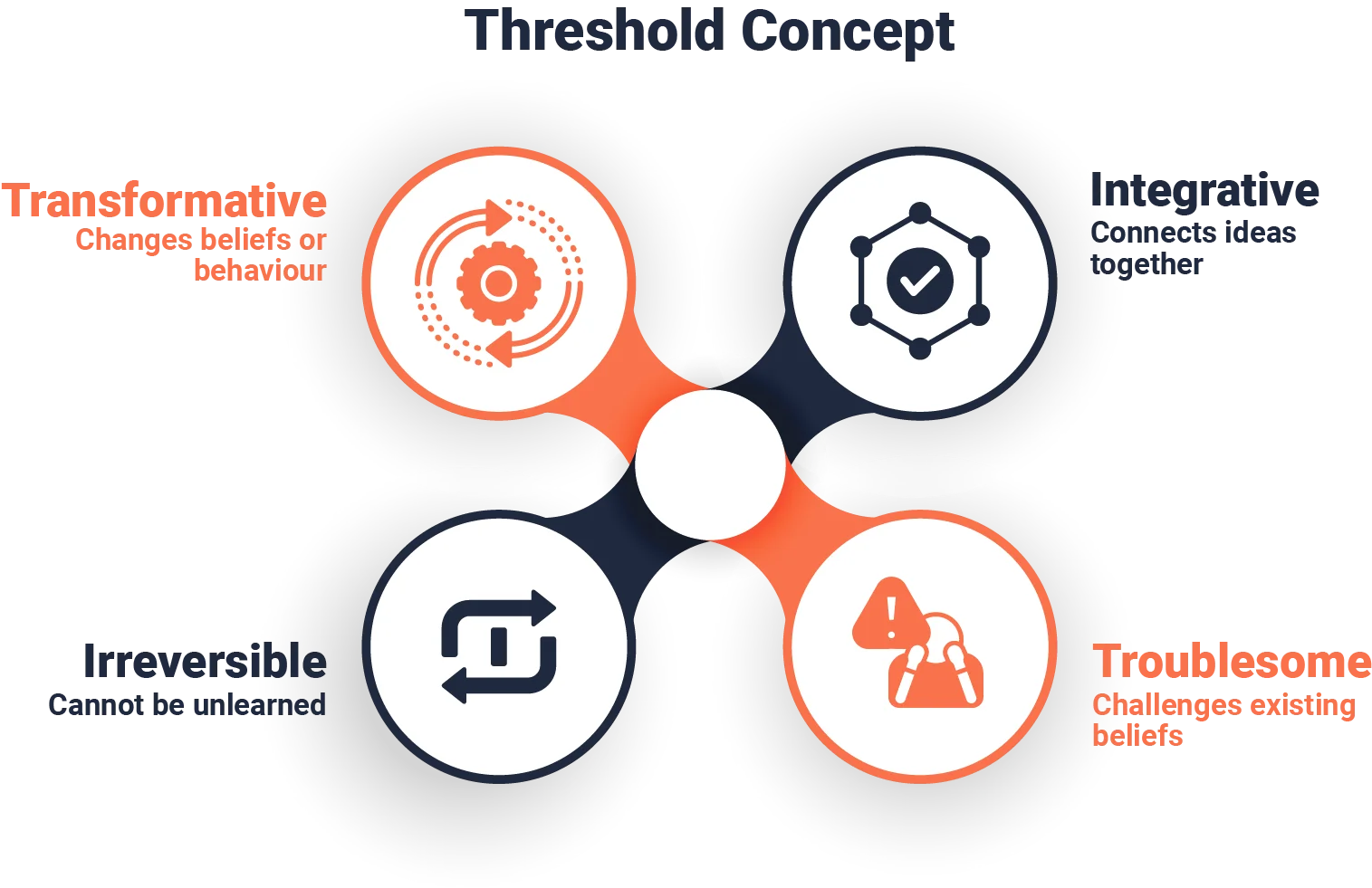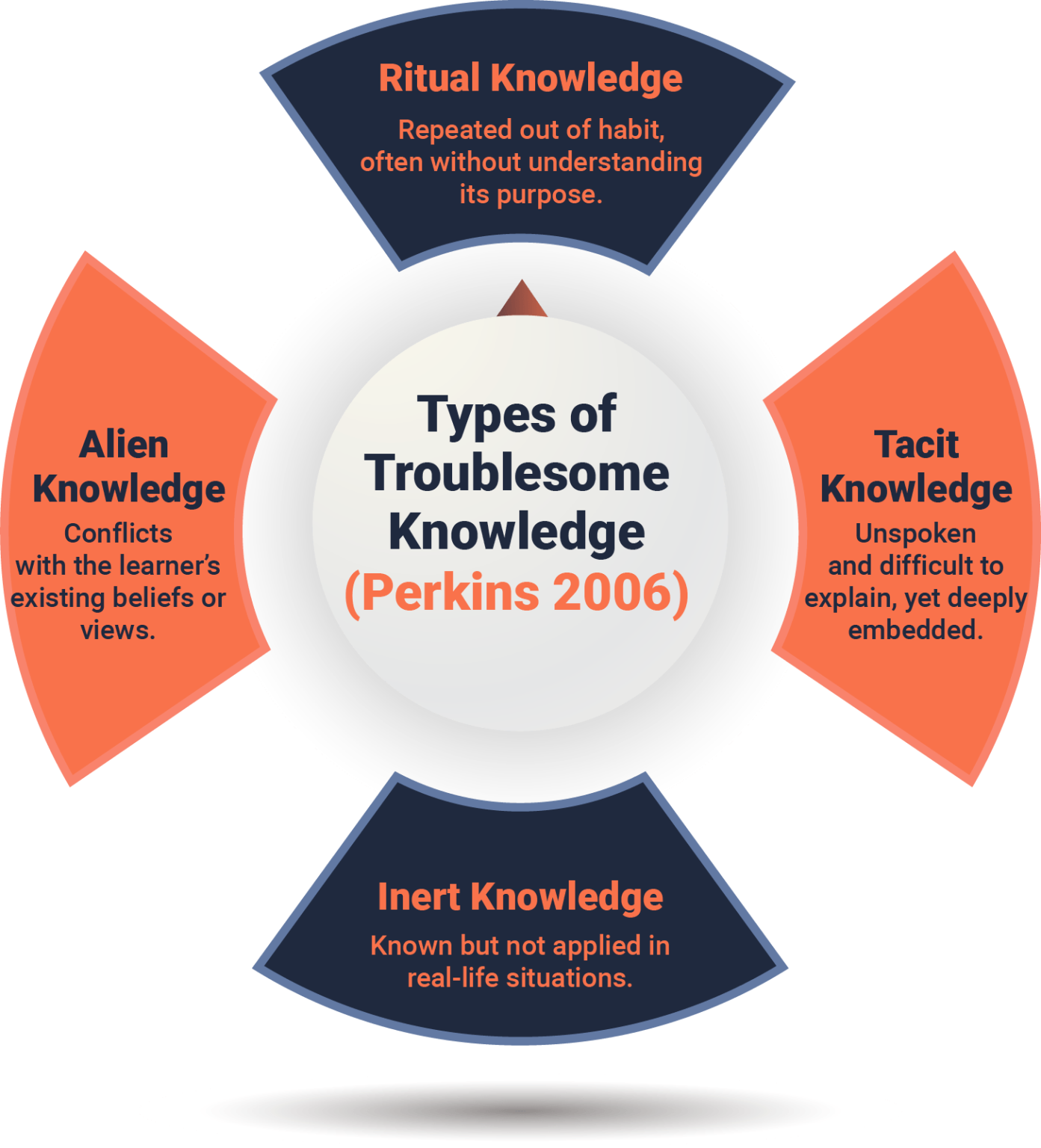Teacher education is not just about learning a curriculum or following structured lesson plans; it is about discovering new strategies and ideas that inspire and evolve thinking. It opens the door to creativity, reflection, and challenging assumptions, ensuring meaningful growth in every classroom.
Key Takeaways:
- Certain new concepts in learning feel difficult or even frustrating at first, but they are essential for helping learners grow and think in more advanced, connected ways and thoughts.
- Struggling to grasp new concepts is part of learning, especially when ideas challenge what we previously believed or seem hard to apply in practice.
- Building knowledge step-by-step helps learners tackle complex ideas with confidence, starting with the basics and moving towards deeper, transformative understanding over time.
In teaching education, such as a Diploma in Teaching (Further Education and Skills), offer certain foundational ideas that are important for educators to shift their mindset, challenge their existing beliefs, and guide them toward professional growth. These ideas are Threshold concepts, troublesome knowledge, and prerequisites; together, they form a foundation for reflective, transformative practice in education.
The Foundations of Deeper Learning
| Threshold Concepts are transformative; once understood, they change the way a teacher views a subject. | Troublesome Knowledge challenges our assumptions and can initially feel uncomfortable, but it’s essential for deep learning. | Prerequisites, on the other hand, ensure that we build knowledge step by step, creating a solid base before diving deeper. |
In this blog, you will learn about these concepts in detail and why they matter in a teaching qualification.
Understanding Threshold Concepts
A threshold concept is a kind of knowledge that shifts the way a learner thinks about a specific subject.
According to educational researchers Jan Meyer and Ray Land,
Threshold concepts typically display the following characteristics:

- Transformative
- Integrative
- Irreversible
- Troublesome
A threshold concept changes how a learner views their subject or role as themselves. For trainee teachers, this might be the realisation that teaching is all about facilitating learning in every way possible. This shift in perspective leads to a change in behaviour, belief and confidence.
These threshold concepts help learners connect separate ideas into a broader, more coherent understanding. For instance, understanding learner motivation might suddenly make classroom management, differentiation, and assessment make more sense, as the same core idea links them.
Once a learner grasps threshold concepts, it becomes a part of how they interpret and approach new situations and is difficult to ‘unlearn’. For example, a teacher who understands the value of formative assessment will make it part of their teaching style.
Sometimes, the threshold concept contrasts with the learner’s previous beliefs or assumptions that make it difficult to accept and process. For example, some trainee teachers struggle with the idea that traditional teaching approaches are not always practical.
The Role of Troublesome Knowledge
Meyer and Land (2003) have rightly said that troublesome knowledge is ‘that which appears counter-intuitive, alien (emanating from another culture or discourse), or seemingly incoherent’.
Troublesome knowledge is a type of knowledge that unfolds slowly, often requiring careful examination and revision. However, once it is understood, it can lead to a deeper understanding and lasting change.
David Perkins identified five types of knowledge that can be troublesome for learners: conceptually difficult, ritual, inert, alien and tacit knowledge. The following are these types that will help explain why some ideas are more complex to grasp:

- Ritual Knowledge
- Inert Knowledge
- Alien Knowledge
- Tacit Knowledge
Perkins (1999) describes ritual knowledge as routine or habitual. He explains that ritual knowledge is “how we answer when asked such-and-such, the routine that we execute to get to a particular result”.
This is knowledge that learners have integrated into their minds and repeated or used out of habit, often losing their understanding, meaning or purpose. This knowledge tends to be applied mechanically, lacking a connection to deeper, more thoughtful reasoning. When questioned about it, we struggle to explain it as it has become subconsciously part of our hidden system of knowledge.
Perkins (1999) states that “Whereas inert knowledge needs more active use, ritual knowledge needs more meaningfulness. This is knowledge that is learned and remembered but not actively used. It remains isolated from practical situations or real-world applications, making it passive rather than functional.
According to Perkins (1999), “Foreign/alien knowledge comes from a perspective that conflicts with our own”. This type of knowledge feels strange or incompatible with a learner’s existing views or experiences. It can seem difficult to accept or integrate, especially when it challenges familiar ways of thinking and reasoning.
Meyer and Land (2003) agree that tacit knowledge is “understandings [that] are often shared within a specific community of practice” as Perkins (1999) points out, “only peripherally aware or entirely unconscious”. In other words, it eventually becomes too challenging to express or understand its theoretical underpinnings. It becomes like the tip of the iceberg, where the hidden part of it remains hidden from our perceptions.
Tacit knowledge is unspoken and often unconscious. Learners may rely on it without being fully aware of it, which makes it harder to examine, question, or change.
Taking in troublesome knowledge takes time and support; it is part of intellectual development. In teacher education, grappling with these kinds of challenges often leads to more thoughtful, flexible, and self-aware practitioners.
What is Prerequisite Knowledge?
Prerequisite knowledge refers to the essential information or skills that learners need before they can meaningfully engage with more advanced ideas and concepts. It acts as a foundation on which deeper learning is built.
In teacher training, for instance, a basic understanding of learning theories and curriculum planning is necessary before tackling more complex practices like adaptive instruction or reflective practice. Without these foundations, learners may find new information confusing or inaccessible.
Prerequisite knowledge also connects to the concept of scaffolding, where tutors provide temporary support to help learners progress until they are able to work independently.
How These Concepts Interconnect in the DiT?
In the Diploma in Teaching (FE and Skills), learning takes place in stages which help trainee teachers grow into confident professionals. The prerequisite knowledge, troublesome knowledge, and threshold concept are built upon each other. This creates a sequence of learning process.
Prerequisite knowledge → Troublesome knowledge → Threshold concept
It begins with prerequisite knowledge, which encompasses a basic framework, theories, terms, and core ideas necessary to engage with more complex teaching practices. For example, a trainee teacher starts by learning about the principles of differentiation, why it matters and what it’s supposed to achieve.
As learners begin to engage with deeper or unfamiliar concepts, they often enter a troublesome phase. This is where the new knowledge challenges their prior assumptions or feels difficult to apply. It is known as the liminal space, an in-between stage where learners are caught between understanding and uncertainty.
Once the learner overcomes this troublesome phase by reframing their thinking or successfully applying the new idea, they cross a threshold concept. At this point, their understanding becomes deeper, more integrated, and often irreversible, marking a significant transformation in how they view teaching and learning.
This is a cycle that repeats with different ideas throughout a curriculum.
Explore These Concepts in Action
Master threshold concept through practice
How Tutors Can Support This Process?
Trainees working through threshold concepts often encounter moments of doubt, discomfort, and confusion, which is an expected part of the learning process.
Tutors play a crucial role in this process, guiding learners and helping them develop their understanding. Here’s how that support can take shape in the context of a teaching qualification:
Build Prerequisite KnowledgeIt is important for learners to ensure that their foundational knowledge is secure before getting into complex topics. Tutors can scaffold this by revisiting essential topics and connecting them to the new learning ahead.
Identify Key Threshold ConceptsTutors can highlight the concepts that are likely to shift a trainee’s perspective. By drawing attention to these, they help learners prepare for the deeper cognitive effort required to engage with them fully.
Normalise Struggle in LearningTutors should reassure trainees that confusion, uncertainty, and challenges are part of the process when engaging with troublesome or transformative knowledge.
Break Down Complex TasksLarge or abstract assignments can become manageable when broken into smaller components. Tutors can support this by providing clear steps, scaffolding tools, and examples that reduce the cognitive load.
Use Practical ExamplesTheoretical ideas make more sense when they are grounded in lived teaching practice. Tutors can illustrate threshold concepts using classroom scenarios, case studies, or personal teaching experiences that demonstrate their relevance.
Encourage Open ReflectionCreating space for open conversation, through discussion, one-on-one check-ins, or reflective prompts, helps learners process difficult content. The ability to talk through uncertainty without judgment is often what enables clarity to emerge. Encouraging learners to engage in journaling, peer discussion, or guided reflection activities helps them internalise and integrate new concepts over time.
Give Ongoing FeedbackRegular formative feedback enables tutors to identify where learners are struggling and provide targeted support. Feedback loops also keep learners engaged and reassured that progress is being made, even if it’s slow.
Support CollaborationCollaborative learning opportunities, such as group discussions, co-planning tasks, or peer reviews, allow learners to learn from one another. Shared experiences help clarify complex ideas and alleviate the sense of isolation that can accompany intellectual struggle.
Conclusion
Understanding prerequisite knowledge, troublesome knowledge, and threshold concepts gives depth and clarity to teacher education. These ideas build on each other and shape how trainee teachers develop their confidence, mindset, and classroom practice. While the process can be challenging, it’s also where meaningful growth happens. With the proper support, learners can navigate uncertainty and grasp new concepts openly.





